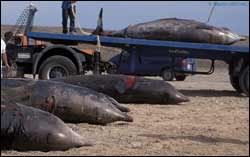
Mid-frequency sonar can emit continuous sound well above 235 decibels, an intensity roughly comparable to a Saturn V rocket at blastoff. Marine mammals have extraordinarily sensitive hearing, and there is no scientific dispute that intense sonar blasts can disturb, injure, and even kill them. Whales exposed to high-intensity mid-frequency sonar have repeatedly stranded and died on beaches around the world; some bleeding from the eyes and ears, with severe lesions in their organ tissue. At lower intensities, sonar can interfere with the ability of marine mammals to navigate, avoid predators, find food, care for their young, and, ultimately, to survive.
Mass stranding and mortality events associated with mid-frequency sonar exercises have occurred, among other places, in North Carolina (2005); Haro Strait off the coast of Washington State (2003); the Canary Islands (2004, 2002, 1989, 1986, 1985); Madeira (2000); the U.S. Virgin Islands (1999, 1998); and in Greece (1996). One of the best documented incidents occurred in the Bahamas in 2000 when 16 whales of three species stranded along 150 miles of shoreline as ships blasted the area with sonar. The U.S. Navy later acknowledged in an official report that its use of sonar was the likely cause of the stranding.
The association between sonar and whale mortalities is "very convincing and appears overwhelming," according to a report issued last year by the scientific committee of the International Whaling Commission, one of the world's leading bodies of whale biologists. The committee also noted concerns that stranding reports may underestimate sonar harm because they do not account for whales that die at sea and are never found."




No comments:
Post a Comment